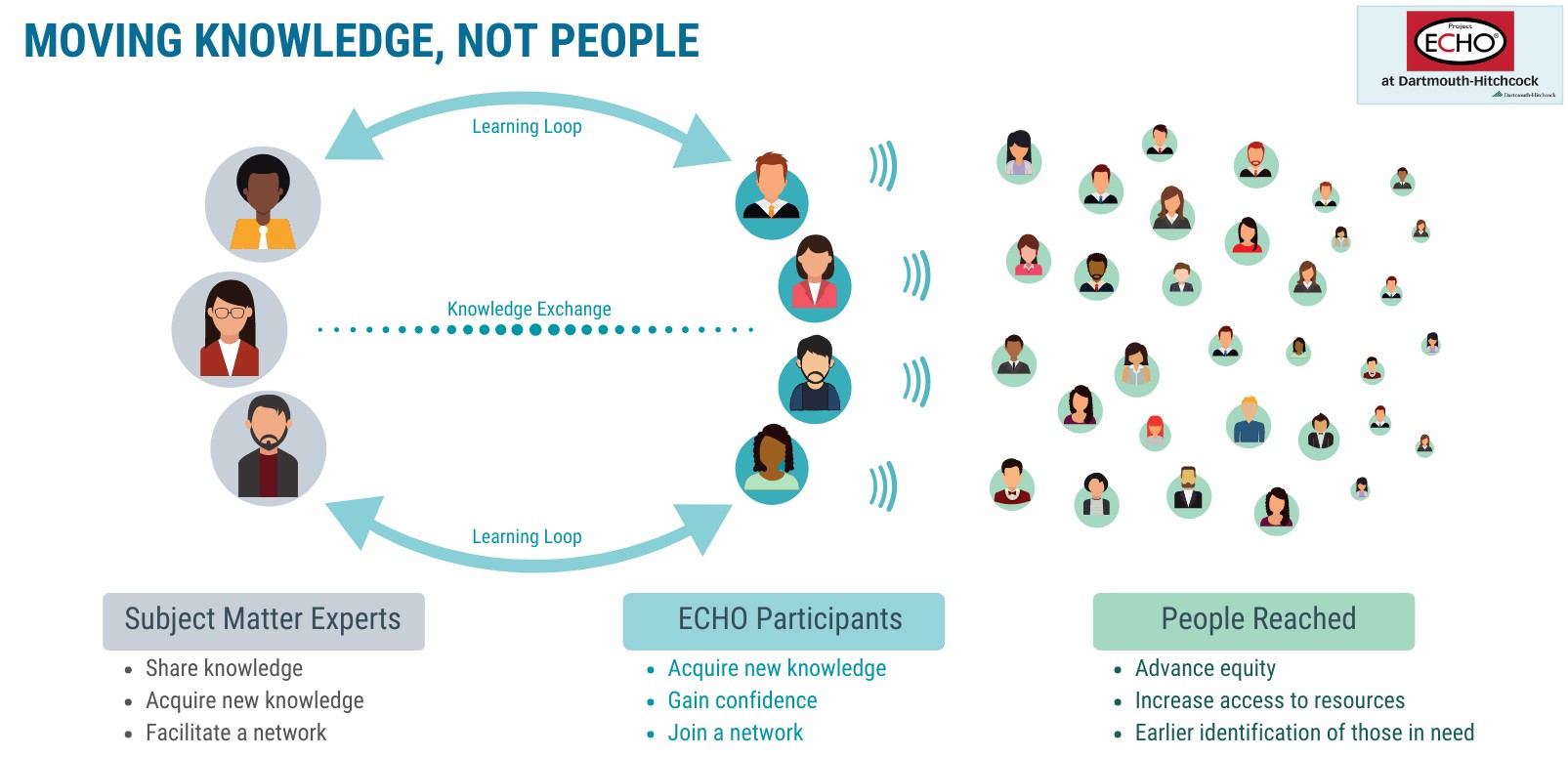
Teach, teach, learn, learn.
That is the model Project ECHO® at Dartmouth Health uses to connect people and their communities in a virtual setting, sharing knowledge between participants and subject matter experts. The program is especially helpful for rural communities seeking expertise on a broad range of health and medical issues.
“Everyone is a teacher, and everyone is a learner,” says Kathleen Broglio, DNP, associate professor of medicine and a nurse practitioner of palliative medicine. Broglio has co-led the Palliative Care ECHO with Robin Larson, MD, MPH through three courses (cohorts) and with the support of the Project ECHO team at Dartmouth Health.
What is ECHO
ECHO is an acronym for Extension for Community Healthcare Outcomes. It grew out of the vision of a University of New Mexico doctor, Sanjeev Arora, who in 2003 created Project ECHO as a no-cost, virtual mentoring platform to provide education to community providers across his state.
Since then, organizations all over the world have utilized this model, including Dartmouth Health, which this year celebrates five years and 54 ECHO cohorts that support improvements in clinical care and community-based health systems.
How an ECHO session is structured
Each ECHO has an inter-professional core panel that may include subject matter experts in the focus area of the ECHO, including physicians, nurses, pharmacists, and social workers, as well as a community member.
 In the first 15 minutes of a session, a presenter gives what is called a didactic—a factual, structured presentation. This didactic is followed by a five-minute presentation of a real-life case when a participant is seeking expert guidance. In the remaining time, the entire group focuses on asking clarifying questions, discussing and sharing viewpoints, and giving recommendations, with the core panel providing insights or guidance. Following the ECHO, the recorded didactic portion is archived for broader access, and a list of resources related to the topic is made openly available.
In the first 15 minutes of a session, a presenter gives what is called a didactic—a factual, structured presentation. This didactic is followed by a five-minute presentation of a real-life case when a participant is seeking expert guidance. In the remaining time, the entire group focuses on asking clarifying questions, discussing and sharing viewpoints, and giving recommendations, with the core panel providing insights or guidance. Following the ECHO, the recorded didactic portion is archived for broader access, and a list of resources related to the topic is made openly available.
Anyone may attend an ECHO session that brings together clinical and community partners to plan, provide, and participate in collaborative education. Because the sessions are held virtually, participants can join from around the country and the world.
The Palliative Care ECHO
For Broglio, being involved in the Palliative Care ECHO has been very fulfilling.
“It has been one of the highlights of my career to be able to put together a high-quality, intensive program like this and provide inter-professional education that has been impactful to the participants,” she says.
Broglio is particularly proud of the faculty development component of the program spearheaded by Larson, providing guidance to junior faculty members through mentorship. It has been meaningful to her to hear the core panel provide recommendations about challenging cases and to see community members engaged and appreciative.
The past three cohorts of the Palliative Care ECHO have been very successful, and the program content has continued to evolve over time. The sessions have had an average of 70 participants and have received high scores on feedback metrics. Fifty percent of participants were repeat attendees.
“Our mission is to improve palliative care throughout our region, and our leadership is committed to the model,” Broglio says. “This was the culmination of what I hoped to do in my career.”
This article first ran under the title of “Project ECHO marks five years” in the June 2024 Issue of Connections Magazine and has been modified for the web.